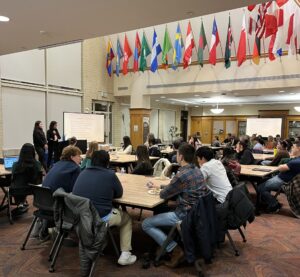A two-tiered mentoring program is preparing 50 students for the academic and professional spheres
This is the first in a series of articles commemorating National Mentoring Month. Each Friday in January, the Daniels Newsroom will share the stories of students, faculty and alumni benefitting from mentorship.

Alanna Jones
One first-year student was struggling to adjust to a new college environment. Another needed advice for securing an internship. Alanna Jones even received a text from an underclassman wondering if a new coffee shop near campus was worth their while.
In all cases, the Daniels College of Business’ Management Club—and its two-tiered mentoring program—was there to help.
“I think the biggest thing we’re trying to formulate is a community where students feel like they belong,” said Jones, a Daniels senior majoring in management and minoring in finance.
Jones is president of the Management Club, and one of three students overseeing an initiative that is providing guidance and companionship to around 50 students this academic year, many of whom have a fuzzier picture of their working future.
While other Daniels majors have more clear-cut career paths, “management” can be a little less precise, said Kathie Novak, a teaching associate professor and advisor of the Management Club, even though management positions exist in every field.
“We’ve really been trying to provide career pathways, in addition to mentoring and internship experience,” Novak said, citing a push initiated by former department chair Charles Dhanaraj. Since the program began in 2022, “students are getting real direction and getting the jobs they didn’t think they could get.”
Peer-to-peer program establishes relationships
The first rung on the Management Club’s mentoring ladder can be climbed during a student’s first quarter at Daniels. As soon as students begin their time in the business school, they have the opportunity to learn from upperclassmen.

The Management Club regularly hosts events to facilitate connections between mentors, mentees and other students.
Because the University of Denver operates on the quarter system, it’s important for first-years and transfers to hit the ground running, said Gemma Tipping, a management and business analytics student who has spearheaded the peer-to-peer mentoring program.
“Regardless of whether it’s professional or not-as-professional, there can be a variety of different things these freshmen and sophomores can be mentored on. It’s a huge value add,” she said. “It could be a range of things from, ‘Here’s how to get across campus faster,’ to, ‘Here’s how I got my internship and what you should be doing,’ or ‘This is what I wish I had done.’”
Mentees are surveyed on their interests and personalities to ensure they share some common ground with their eventual mentor. The program’s only requirement is that pairings meet twice per quarter.
“It’s a relatively low time commitment for such a huge value add,” Tipping said. “There is so much to be received within a mentorship, in terms of the personal connection, the friendships, the insider advice. The value you can get for it just to show up for someone is a good return on investment.”
That’s true no matter what side of the mentoring relationship you’re on, said Amina Penn (BSBA 2023), a 4+1 student and past president of the Management Club.
“I think [mentors] gain a lot from underclassmen as well,” she said. “It’s a very mutual relationship all around. I think that’s also a big lesson to learn: Taking advantage of an opportunity to give back is another life lesson that is a huge aspect of maturity that you learn as you transition from academic to career.”
Professional program creates protégés
Once a student has served as a peer mentor, they become eligible to become a “protégé” in the second tier of the Management Club program.
Professionals from a variety of industries offer their time and expertise to those who will be joining the workforce soon.

Amina Penn
“We recognize that once you’re in the real world, it can be really hard to build connections,” Penn said. “You’re at the bottom of the food chain in the corporate world, you may have moved to a new place, you don’t know anyone. Having someone you can go to for advice, a professional mentor who has gone through that journey—at least you have someone to rely on.”
Recognizing the breadth of the management profession, Penn leaned on Daniels advisory boards and alumni to aggregate a pool of mentors from consulting companies, tech industries, the health care sector and more. She then arranged pairings and coordinated trainings to outline the program’s expectations and goals.
Penn, Tipping and Jones all know the benefits of the professional-protégé relationship first-hand. Whether it’s floating ideas, preparing for interviews, gaining insider industry information or drafting a professional email to a contact, the trio feels ahead of the game.
“A lot of [getting your foot in the door] comes from interpersonal connection rather than anything you can learn in the classroom,” Tipping said. “That’s one of the biggest things I’ve gained from having a mentor.”
Jones agreed. “[My mentor stressed] how important that ‘student’ title in your name is and how many connections you can make because of it,” she said. “Professionally, I’ve had a lot of practice interviewing with her and seen her perspective on what path she thinks would be beneficial for me to take. So now I have more set steps I can take rather than just throwing myself out there and finding something that works.”
Mentorship’s lasting impact
When Novak looks at the students who have been through the mentoring program, she notices results far more meaningful than an offer letter or a paycheck.
“I have seen such an increase in confidence and poise in how they carry themselves as they get ready to graduate,” she said. “I think they feel a whole lot better about their own job search and where they’re headed after school.”
From experience, the leaders of the Management Club say, that’s accurate. And they are determined to build an infrastructure that supports the mentorship program well into the future.
“This is something we want to last beyond the three, four, five years that students are at DU,” Penn said. “Hopefully the people who participate in these mentorship programs come back in 5-10 years and become professional mentors for our students. That’s the ultimate goal: the full cycle that DU can support.”
The Management Club is always looking to engage with alumni and industry professionals. Contact Kathie Novak if you are interested.
